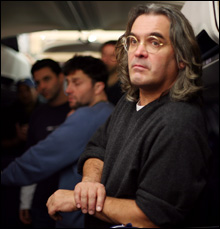 While interviewing Paul Greengrass, I was determined not to ask the question that has dogged United 93 like a tag line: “Is it too soon?” It didn’t matter; within five minutes he would ask it himself.
While interviewing Paul Greengrass, I was determined not to ask the question that has dogged United 93 like a tag line: “Is it too soon?” It didn’t matter; within five minutes he would ask it himself. “I was in London in postproduction on a film called Bloody Sunday ,” he says, recalling when he first heard about the 9/11 attacks. “Which was also about terrorism, the impact of it, what can go wrong and how easy it is to overreact. And I just remember thinking . . . well, just the unimaginable shock of it all. As the years went by, I thought, I’ve made quite a few films about political violence, but what’s the point if I don’t address the most important act of political violence in our lifetime?
“But I did think it was too soon then. And also, the 9/11 commission was sitting and . . . I thought, I need to wait for that to report. Then all the personal reasons. The fact that I had then made Omagh [a film about a Northern Ireland community rocked by a terrorist attack in 1998]. At the end of it I just felt I needed to go do something else. I wanted to have some fun, to be honest. I wanted to try to make a commercial film.”
Greengrass then made The Bourne Supremacy , a box-office success. (He is now doing The Bourne Ultimatum .) Next he began preparations to adapt Watchmen , a paranoid fantasy graphic novel by V for Vendetta ’s Alan Moore, but Paramount pulled the plug. So he decided the time had come for United 93 .
As with Bloody Sunday and Omagh , he engaged the approval and collaboration of the victims’ families and many of the participants before proceeding. “This film was also collectively made. The plan was, a group of unknown actors from New York, not movie stars or big budgets. A lot of people from the air-traffic control, who were there on the day. A lot of people from the National Command Center. And a lot of people from the military. The Pentagon was amazing about helping us do that. They’ve all seen it [the film]. The Pentagon military guys wrote us the most amazing letter after seeing the film. The gist of it was . . . they thought it was a very accurate portrayal of what had not been a great day for them . . . but thank God for those great men and women on the airplane. While the system was broken on the ground, they stepped up to the plate.
“In the end, if this film has any strengths at all, it’s . . . the participation of all those people. When people say, ‘Is it too soon?’ I say, if it’s too soon, then those people would never have agreed to do it. They did it because they believe it’s high time that we looked at it.”
Okay, so it’s not too soon. But is it in time to have an impact (along with the other 9/11 movie, Oliver Stone’s World Trade Center , which opens in August), one way or the other, on the Congressional elections in November?
“Honestly, I don’t have a view on that,” says Greengrass. “I would hate for this film to be drawn into a party political debate. Its purpose is simply this: all of us who disagree so profoundly about where we are today — let’s agree to go back to where it all began. Which is those two hours. Let’s see what lessons we can draw from it. And I think those lessons are going to challenge all of us on whatever side of the divide we are today.”